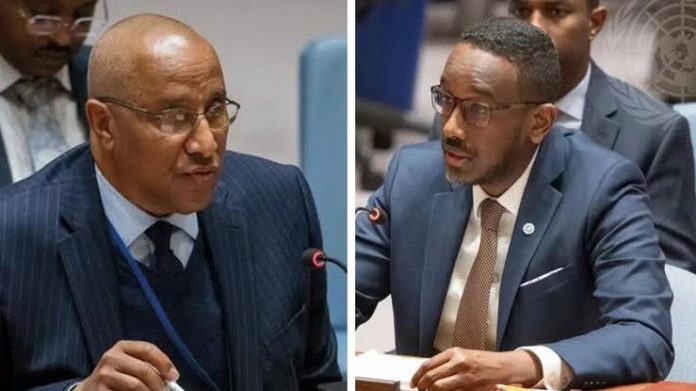Facebook Twitter (X) Instagram Somali Magazine - People's Magazine
Ethiopia has been excluded from the upcoming African Union-led peacekeeping mission in Somalia, known as the African Union Support and Stabilization Mission in Somalia (AUSSOM). Somali representatives announced the decision during a United Nations Security Council (UNSC) meeting on December 27, 2024.
This exclusion follows a diplomatic fallout between Somalia and Ethiopia over Ethiopia’s controversial agreement with Somaliland, the breakaway region of Somalia.
A Shift from AMISOM to AUSSOM
AUSSOM is set to replace the African Union Transition Mission in Somalia (ATMIS), which concludes on December 31, 2024. The new mission aims to continue countering Al-Shabaab and stabilizing Somalia, with 11,000 troops pledged from troop-contributing nations.
Although Ethiopia has been a key player in African Union-led peacekeeping missions since AMISOM began in 2007, it will not be part of AUSSOM. Somali representatives clarified this during the UNSC meeting, stating that troop allocations had been determined through bilateral agreements established in November.
Somalia’s Representative Addresses UNSC
Mohamed Rabi Yusuf, Somalia’s permanent representative to the UN, explained the decision, emphasizing the need for security arrangements aligned with Somalia’s interests.
“Due to documented actions by Ethiopian and Somali forces over the past eleven months, the Federal Government of Somalia undertook a comprehensive review of its security partnerships. This review has led to troop commitments from regional partners, addressing any potential security vacuum created by Ethiopia’s exclusion,” Yusuf stated.
Reports suggest that Uganda, Kenya, Djibouti, and Burundi will contribute to AUSSOM, with Uganda providing over half of the required troops.
Diplomatic Tensions and Exclusion of Ethiopia
Somalia’s decision to exclude Ethiopia is rooted in strained relations following Ethiopia’s agreement with Somaliland earlier this year. Many believed Ethiopia would be included in AUSSOM after Somali President Hassan Sheikh Mohamud and Ethiopian Prime Minister Abiy Ahmed signed the Ankara Declaration to restore diplomatic ties.
However, analysts point to President Mohamud’s visit to Asmara, Eritrea, shortly before the UNSC meeting as a turning point. This was Mohamud’s second visit to Asmara in two months, and his discussions with Eritrean President Isaias Afwerki and Egyptian President Abdel Fattah al-Sisi may have influenced the decision.
Egypt has expressed interest in participating in AUSSOM, though it remains unclear if it will contribute troops.
Funding Controversies at the UNSC
The UNSC meeting also highlighted challenges in funding the new mission. A proposed “hybrid model” for financing AUSSOM, based on UN Resolution 2719, faced opposition from the United States.
The model, backed by Russia, China, the EU, and others, proposed that UN-assessed contributions cover 75% of the mission’s budget, with the remainder funded by the international community. However, the US rejected the plan, arguing it deviates from the intent of Resolution 2719 and would unfairly burden UN resources.
“Our decision to abstain on this resolution was not taken lightly. The US remains committed to supporting African Union peace operations but cannot endorse a model that lacks a transition to a consolidated budget,” said the US representative.
Implications for the Region
The exclusion of Ethiopia and funding uncertainties raise concerns about the mission’s effectiveness. The African Union Peace and Security Council warned that delays in securing sustainable financing could undermine AUSSOM’s objectives and exacerbate instability in the Horn of Africa.
Despite these challenges, AUSSOM represents a critical step in Somalia’s fight against Al-Shabaab and its broader efforts to achieve lasting peace and stability.
Key Takeaways and Hashtags
Ethiopia excluded from AUSSOM following Somalia’s review of security partnerships.
Diplomatic tensions between Ethiopia and Somalia fueled by Somaliland agreement.
UNSC debates funding model for AUSSOM, with US opposing hybrid proposal.
AUSSOM to replace ATMIS, focusing on countering Al-Shabaab and stabilizing Somalia.
Troop contributions pledged by Uganda, Kenya, Djibouti, and Burundi.

